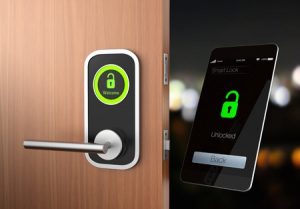Posted At: Sep 23, 2023 - 3,340 Views

Top 10 scenarios where smart locks can be used:
1. Residential homes: Smart locks can replace traditional key locks, allowing users to unlock the door using a password, fingerprint, RFID card, or remote control. They can also integrate with home automation systems for features such as remote monitoring and scheduled lighting.
2. Hotels: Smart locks can be used in hotel rooms to provide convenient and secure access for guests. They can be easily programmed and managed by hotel staff, allowing for keyless entry and improved security.
3. Airbnb rentals: Smart locks offer a convenient solution for managing access to Airbnb rentals. Hosts can remotely grant access to guests, track entry logs, and reduce the need for physical key exchanges.
4. Office buildings: Smart locks can enhance security in office buildings by replacing traditional key systems. Employees can use their smartphones or access cards to enter the premises, and administrators can manage access permissions remotely.
5. Co-working spaces: Smart locks can be utilized in co-working spaces to provide secure and flexible access for members. Access can be granted and revoked remotely, and usage logs can be monitored to track occupancy.
6. Schools and universities: Smart locks can be employed in educational institutions to secure classrooms, dormitories, or administrative areas. Access can be granted to students, staff, and authorized personnel through various authentication methods.
7. Gyms and fitness centers: Smart locks can be used in gyms to control access to locker rooms or restricted areas. Members can use their smartphone, membership card, or fingerprint to gain entry, and access can be managed remotely.
8. Vacation rentals: Similar to Airbnb rentals, smart locks can be used in vacation rentals such as cabins, villas, or beach houses. Guests can be provided with temporary access codes to unlock the door during their stay.
9. Warehouses and storage facilities: Smart locks can be utilized in warehouses and storage facilities to control access to inventory or restricted areas. Authorized personnel can use their credentials to gain entry, and access logs can be monitored for security purposes.
10. Elderly care facilities: Smart locks can enhance the security and convenience of elderly care facilities. Caregivers and authorized individuals can use their fingerprint or RFID card to unlock doors, ensuring the safety of residents.
11. Parking garages: Smart locks can be used to secure access points in parking garages. Users can use their smartphone or access card to enter and exit the garage, and administrators can monitor usage and control access remotely.
12. Vacation homes: Smart locks can be installed in vacation homes to provide secure and convenient access for owners and guests. Authorized individuals can use a PIN, smartphone, or access card to unlock the door, eliminating the need for physical keys.
13. Shared bicycles/scooters: Smart locks can be integrated into bike or scooter sharing systems, allowing users to unlock and rent bikes using a smartphone app. The smart lock ensures the security and tracking of shared vehicles.
14. Community buildings: Smart locks can be used in community buildings like recreation centers or clubhouses. Residents can use their access cards or smartphones to gain entry, and access permissions can be managed centrally.
15. Hospitals and healthcare facilities: Smart locks can be employed in hospitals and healthcare facilities to control access to medical supply rooms, restricted areas, or patient rooms. Authorized personnel can use their credentials to unlock doors, and access can be monitored and managed remotely.
These are just a few examples of the many places where smart locks can be utilized to improve security, convenience, and access control.

